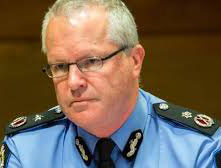Aboriginal genocide
 West Australian Police Commissioner Chris Dawson (pictured) wants to impose the nation’s most severe restrictions on the sale of alcohol across the entire northwest of Australia — including in the tourist hubs of Broome and Kununurra — under a secret proposal by police, who consider the region in unprecedented crisis.
West Australian Police Commissioner Chris Dawson (pictured) wants to impose the nation’s most severe restrictions on the sale of alcohol across the entire northwest of Australia — including in the tourist hubs of Broome and Kununurra — under a secret proposal by police, who consider the region in unprecedented crisis.
After consulting frontline workers and indigenous leaders, Mr Dawson has asked the WA Director of Liquor Licensing for a radical crackdown on bottleshops in every town in the region.
“This application has been made as a result of ongoing concerns regarding the harms of excessive alcohol consumption across the Kimberley,” Mr Dawson said.
“These harms are significant. They impact upon law and order in the community in addition to the health and welfare of community members, and can only be addressed through a combined whole-of-government and community effort.”
Senior Aboriginal man Ian Trust, executive chairman of the Kununurra-based Wunan Foundation, said alcohol abuse was so rife in the east Kimberley that it was beginning to damage the economy. “If the community is not safe, nobody wants to live there,” he said. “We have had that many businesspeople come to us wanting to sell out.”
Mr Trust said the effect of alcohol abuse was devastating for children in Kununurra. About 70 local children — most of them indigenous — were periodically in trouble with police for crimes they committed in small groups while roaming at night, he said.
Home was often not safe for these children, Mr Trust said. One boy recently cried on his cell floor at the Banksia Hill Juvenile Detention Centre in Perth when told he was going home to Kununurra; he wanted to stay in jail
“He was saying nobody loves me,” Mr Trust said. “These children just think no one cares for them.”
The police push comes 12 years after indigenous women of the small inland Kimberley town of Fitzroy Crossing enlisted the support of then police commissioner Karl O’Callaghan to ban the sale of full-strength takeaway alcohol.
Emergency department presentations fell 36 per cent in the first 12 months of the ban. Two years later, a ban on full-strength takeaways was rolled out to the nearby town of Halls Creek, once described by paediatrician John Boulton as “the Gaza Strip of the Kimberley” because of alcohol-fuelled violence.
Aboriginal children damaged for life by the scourge of FASD
A subsequent study found the world’s highest rate of foetal alcohol spectrum disorder among children born in and around Fitzroy Crossing and Halls Creek before the alcohol restrictions. The disorder, known as FASD, is lifelong brain damage caused to a developing foetus when a pregnant woman drinks. This phenomenon may go a long way to explain the level of criminally dangerous behaviour of so many adult Aboriginals
WA Police was prompted to investigate the extent of alcohol-related crime and harm in the Kimberley after WA Coroner Ros Fogliani’s February 2019 report into the suicides of 13 indigenous children and young people in the region between 2012 and 2016. “Almost all of the children and young persons grew up in homes marred by the effects of high levels of alcohol abuse, and this was also deeply unsettling for them,” she wrote.
“For nine of the children, the level of alcohol abuse in the home compromised the ability of the parents to properly care for their children to such an extent they were informally placed into the care of other family members for extended periods.
“A number of the young persons (including four of the children) had abused alcohol or other drugs from a young age. Some of the children had presented to hospital emergency departments for treatment of alcohol-related trauma during their teenage years.
“In seven of the cases, there was significant alcohol use in the lead-up to the deaths, and at least two of the young persons had very high blood alcohol levels when they died.
The Kimberley’s population was just over 34,000 at the 2016 census, which found 50.1 per cent of residents were indigenous.
Yawuru leader Peter Yu favours a banned-drinkers register over restrictions that would apply to all. He considers the matter to be of high importance.
“I don’t want to be pessimistic but people have to realise what the situation is — alcohol is a major factor in the ill health, death, dysfunction, disorder and costs in this region,” he said.